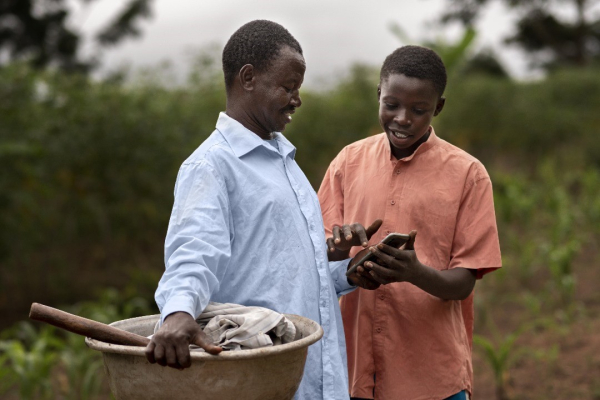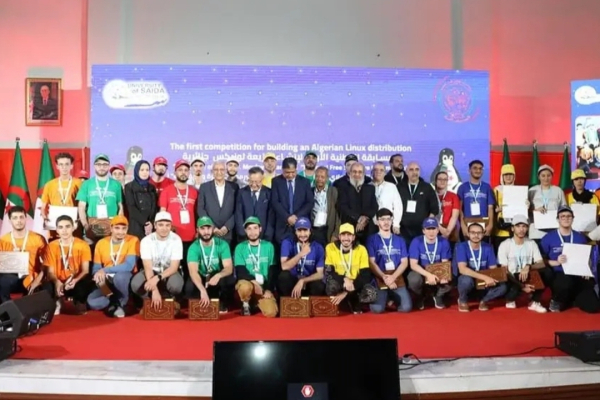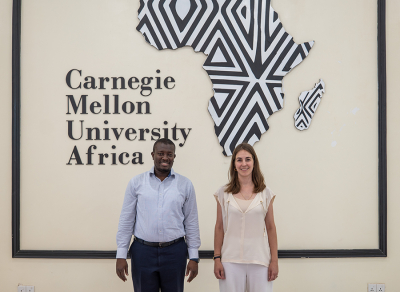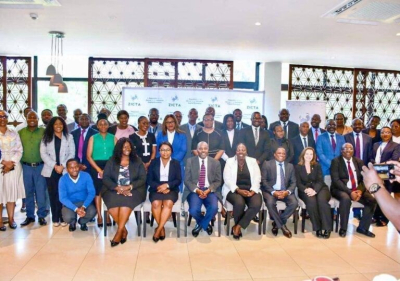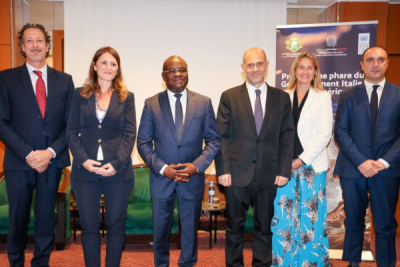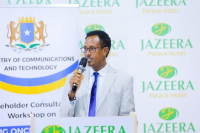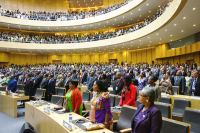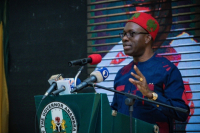
News (1792)
Agriculture drives economic growth across Africa, but most smallholder farmers still rely on outdated tools, leading to low yields and profits. Digital technologies offer a solution by streamlining processes, improving access to data, and boosting productivity.
The Food and Agriculture Organization (FAO) launched the "Fostering Digital Villages through Innovative Advisory and Profitable Market Services in Africa (FDiVi)" project on Novemeber 14 in Musanze District, Rwanda. This initiative is set to transform Rwandan agriculture through the integration of digital tools tailored to rural needs. The launch gathered key stakeholders, including representatives from the Food and Agriculture Organization (FAO), farmer organizations, youth groups, women leaders, and field agents.
In his speech, Mr. Placide Nshuti Kanyabujinga, FAO Rwanda’s representative, highlighted the importance of partnerships in ensuring the success of the FDiVi project.
According to the Rwanda Development Board (RDB), the country’s agriculture sector accounts for about 25% of GDP and employs about 64.5% of the population. This highlights the critical importance of agriculture to the country's economy and its people.
The FDiVi project, developed in collaboration between FAO and Rwanda’s Ministry of Agriculture and Animal Resources (MINAGRI), aims to modernize agricultural practices by equipping farmers with access to real-time information, weather updates, and market opportunities. It aligns with national priorities of empowering youth and women while promoting sustainable economic growth in rural communities.
This launch underscores a commitment to enhancing rural digital skills and integrating innovative tools to optimize yields, boost market access, and build a sustainable agricultural future for Rwanda. It aligns with the FAO Strategic Framework 2022–2030 that aims to accelerate the transformation to more efficient, inclusive, resilient and sustainable agrifood systems for better production, better nutrition, a better environment and a better life, leaving no one behind.
According to the GSM Association (GSMA), integrating technology with tools like big data, GPS, and drones could boost African crop yields by 10.5% to 20% over the next five years. In its May 2024 report, Driving Digital Transformation of African Economies, GSMA also forecasts a 23% rise in agricultural profits through increased ICT adoption. The report highlights the critical role of targeted digital investments by African governments to stimulate growth in agriculture and other key economic sectors.
Hikmatu Bilali
In an increasingly digital world, countries are striving to bolster their technological capabilities. Local solutions, particularly free and open-source software, play a crucial role in this dynamic.
On Tuesday, November 19, Algerian Minister of Higher Education and Scientific Research Kamel Baddari presided over the official launch of Algeria's operating system at the Dr. Moulay Tahar University in Saïda. The Linux-based system marks a milestone in the country’s digital modernization efforts and the enhancement of its technological capabilities.
“This fully Algerian system is the outcome of collaborative work between students and software researchers from multiple universities. This Linux distribution, blending user-friendliness with robust security, will enhance computer performance and safeguard our information systems. It also lays the groundwork for an open technology economy by providing a strong foundation for the development of numerous software startups,” Baddari said during the ceremony.
The initiative is part of a broader national strategy to modernize Algeria’s universities and position them as hubs for technological innovation. Spearheaded by Dr. Moulay Tahar University, the project involved a nationwide competition, with 10 university teams tasked with designing the operating system. This effort mirrors other recent technological advances in Algeria, such as the launch of the country’s first electric car in April 2023, developed by the Industrial Technology Research Center (CRTI).
The launch coincides with robust global growth in the open-source software market. According to a 2024 report by research firm GitNux, the global open-source market, valued at $21.7 billion in 2021, is projected to reach $66.84 billion by 2026. Additionally, open-source software adoption reportedly saves companies around $60 billion annually worldwide.
These figures underscore the significance of Algeria’s project, which could strengthen the country’s position in the global open-source market while fostering local innovation. The Algerian operating system, designed to meet the demands for cybersecurity and efficiency, could play a pivotal role in the country’s digital transformation while showcasing the talents of its young researchers and entrepreneurs.
Samira Njoya
Sub-Saharan Africa has one of the lowest internet penetration rates globally. This limited connectivity underscores the importance of locally driven solutions, such as the Upanzi Network, which aim to develop accessible, culturally relevant technologies tailored to African contexts.
The Carnegie Mellon University Africa (CMU-Africa) announced, on November 20, the expansion of a groundbreaking initiative aimed at fostering secure, inclusive, and resilient digital public infrastructure across Africa.
CMU-Africa’s director, Conrad Tucker, emphasized the importance of local context, stating, “There are no one-size-fits-all solutions for Africa. Collaboration among researchers from diverse regions is essential to create tailored digital solutions.”
Launched in 2021 at CMU-Africa’s Kigali campus, the Upanzi Network, an Africa-based collaboration of engineering research labs, has pioneered research in critical areas such as digital identity, payments, cybersecurity, artificial intelligence, and data governance. Building on this foundation, the initiative is now partnering with leading universities across the continent, including Al Akhawayn University in Morocco, the University of Botswana, and the University of the Witwatersrand in South Africa.
Each partner lab has been awarded a one-year seed grant to support research tailored to specific regional needs. In Morocco, Al Akhawayn University is establishing a lab to enhance governance through digital transformation, prioritizing efficiency, transparency, and inclusivity in public services. In Botswana, researchers at the University of Botswana are utilizing IoT technologies to address challenges in farming, such as animal health and water management, aiming to improve agricultural productivity and engage youth through targeted workshops.
Meanwhile, the University of Witwatersrand in South Africa is focusing on multilingual learning technologies to overcome social and educational barriers while advancing digital literacy across diverse linguistic contexts.
The network’s researchers will convene this week at a symposium focusing on digital identity and cybersecurity, underscoring the initiative’s commitment to addressing Africa’s most pressing digital challenges.
The United Nations Development Programme (UNDP) highlights digital public infrastructure (DPI) as a key enabler of digital transformation and efficient public service delivery. Properly implemented, DPI supports national priorities and accelerates progress toward Sustainable Development Goals (SDGs). Governments, donors, private entities, and civil society have a shared opportunity to shape inclusive and impactful digital ecosystems.
The Upanzi Network’s initiatives address critical challenges in digital infrastructure and human development, ensuring Africa’s digital future is inclusive, resilient, and innovative. This expansion represents a significant stride toward empowering Africa’s socio-economic development through localized, innovative, and inclusive digital infrastructure.
Hikmatu Bilali
The Djiboutian government is prioritizing the digital economy as a key driver of its development strategy. To ensure that this sector contributes fully to the country's growth, the government is also heavily focused on securing its national cyberspace.
Mariam Hamadou Ali (photo, left), Djibouti's Minister of Digital Economy and Innovation, conducted an official visit to Qatar to discuss cybersecurity, according to the ministry's social media posts on Tuesday, November 19. During her visit, she met with Abdulrahman bin Ali Al Farahid Al Malki (photo, right), head of Qatar's National Cybersecurity Agency. Their discussions focused on the issue of cybersecurity and explored "ways to develop and strengthen the partnership in this field," as reported by the Qatar News Agency.
This visit aligns with the priorities outlined by Djibouti's President, Ismaïl Omar Guelleh, during the national political assembly in August. The president emphasized the crucial role of the digital and telecommunications sectors in the country’s development. It also comes ahead of the imminent launch of Djibouti's national cybersecurity strategy, a project underpinned by the formation of strategic alliances to bolster the nation’s defenses against cyber threats.
According to the Global Cybersecurity Index 2024 published in September by the International Telecommunication Union (ITU), Djibouti is a Tier 4 country, with a score of 31.47 out of 100. This category, as defined by the ITU, includes countries demonstrating a foundational commitment to cybersecurity through government-led actions involving evaluation, establishment, or implementation of generally accepted cybersecurity measures in at least one pillar or across several indicators or sub-indicators.
In contrast, Qatar stands as a global leader in cybersecurity, earning a perfect score of 100 in the same ITU index. For Djibouti, a partnership with Qatar presents a significant opportunity. Potential benefits include the exchange of expertise, sharing of intelligence on emerging cyber threats, enhancement of digital infrastructure, and targeted investments. Such collaborations could play a pivotal role in building a resilient and robust cybersecurity ecosystem in Djibouti.
Adoni Conrad Quenum
As digital adoption rises across Africa, so does cybercrime, threatening national security. Tackling these threats is essential for protecting digital economies and fostering sustainable growth.
Zambia announced on November 19 that it is strengthening its defenses against cybercrime through a partnership with the International Telecommunication Union (ITU). This collaboration aims to enhance digital security by equipping prosecutors and law enforcement with advanced skills to tackle emerging cyber threats.
Technology and Science Minister Felix Mutati, speaking through his representative, director of communication and digital technologies, Milner Makuni emphasized that the escalating cyber threats demand continuous professional training and collaboration. Equipping law enforcement with skills in digital forensics and AI-driven tools for threat detection will create a safer cyber environment for citizens and businesses alike.
The event, hosted in collaboration with the International Telecommunication Union (ITU) and the Zambia Information and Communications Technology Authority (ZICTA), highlighted the urgency of addressing rising cybercrime incidents.
Key initiatives announced include training and reskilling programs to equip prosecutors and stakeholders with expertise in digital forensics, electronic evidence management, and predictive analysis technologies. Legislative enhancements are also underway, with ongoing revisions to the Cyber Security and Cyber Crimes Act to ensure a robust and adaptive legal framework.
ITU representative Annrita Ssemboga praised Zambia’s proactive role in the Global Digital Compact and commended its efforts to advance cybersecurity on the continent. ZICTA Acting Director-General Engineer Collins Mbulo highlighted the growing scope of digital crimes, urging regulators and law enforcement to remain vigilant.
In 2021, the Zambia Computer Incident Response Team (ZM-CIRT) recorded over 10.7 million cyberattacks, including mobile money scams, social media hijacking, and fraudulent online schemes. Between 2020 and the second quarter of 2022, the financial sector lost over K150 million, with K6 million attributed to pyramid schemes. These figures underscore the growing threat of cybercrime in Zambia.
This initiative strengthens Zambia's digital resilience, fostering economic opportunities while protecting its citizens and businesses from escalating cyber threats. By aligning with global standards and leveraging advanced technology, Zambia is setting a benchmark for cybersecurity in the region, essential for long-term socio-economic stability.
Hikmatu Bilali
Digital transformation has become a crucial driver of economic and social development worldwide. Governments and their partners are stepping up initiatives to harness digital potential and bridge technological divides.
On Monday, November 18, the Ivorian government launched the Digital Readiness Assessment (DRA) and the Digital Flagship for West Africa project. Spearheaded by the Ministry of Digital Transformation and Digitalization, in partnership with the United Nations Development Programme (UNDP) and the Italian embassy, these initiatives aim to strengthen the digital ecosystem and advance Côte d'Ivoire toward a connected, inclusive society.
“Although it’s just one step, we’re realizing a vision a Côte d'Ivoire firmly committed to digital transformation as championed by President Alassane Ouattara,” stated Ibrahim Kalil Konaté, Minister of Digital Transformation and Digitalization.
The Digital Readiness Assessment, developed by UNDP, serves as a strategic tool to set data-driven digital priorities. It also identifies technological opportunities that could accelerate sustainable development goals and enhance the country's digital preparedness.
Funded by the Italian government, the Digital Flagship for West Africa project focuses on improving connectivity in rural and remote areas, strengthening digital infrastructure, and creating efficient public digital systems.
Both projects align with the National Digital Development Strategy for 2025, which aims to connect the entire country, develop digital skills among civil servants and young people, and support digital entrepreneurship. Côte d'Ivoire has already made significant strides, with more than 30,240 km of fiber optic cable installed, covering 94.86% of the country’s localities as of March 31, 2024, according to the telecom regulator.
These new initiatives are expected to provide a detailed assessment of existing infrastructure, pinpoint gaps, and outline strategic priorities for balanced sector development. They also aim to reduce the digital divide by bringing quality Internet access to underserved areas, thereby promoting digital inclusion and territorial equity.
Samira Njoya
Somali authorities aim to strengthen digital infrastructure. The telecom regulator is working with the International Finance Corporation (IFC) to develop a new regulatory framework for fiber-optic submarine cables.
Somali plans to improve the country’s digital infrastructure by developing a unified fiber-optic deployment policy. For that purpose, the Ministry of Communications and Technology held public consultations on November 17 and 18 to gather input from stakeholders.
“The unified fiber-optic deployment policy aims to guide national telecom companies toward collaboration in installing and expanding fiber-optic cables. This initiative will help reduce the costs associated with deploying and expanding fiber infrastructure while promoting the growth of a modern digital economy and national interconnectivity,” the ministry announced on its Facebook page on November 17.
In its Digital Economy Diagnostic – Somalia report, published in March 2024, the World Bank indicated that Somalia’s domestic fiber network remains significantly underdeveloped and fragmented. It noted that only isolated segments have been deployed by sub-regional operators, while cross-border links remain weak. Although Somalia is connected to five international submarine cables, with a sixth expected in 2025, the lack of a robust domestic infrastructure limits the equitable distribution of available capacity.
“The absence of a robust backbone network prevents the distribution of international capacity across Somalia, yielding uneven access to broadband, mixed network quality, limited redundancy, and hampers market competition,” the report stated.
Densifying the national fiber-optic network through this policy could improve internet quality and coverage across Somalia. However, challenges persist, as the World Bank pointed out, which could hinder internet adoption, with penetration rates standing at only 27.6% in early 2024, according to DataReportal. Key obstacles include limited access to affordable, broadband-compatible devices, a lack of attractive data-based services, insufficient relevant local content, and a digital skills gap.
Isaac K. Kassouwi
Cloud technologies are essential to modern IT, enabling businesses to create scalable and resilient applications. However, a shortage of skilled professionals hinders adoption. Training African developers in this field opens access to high-paying tech jobs locally and globally.
Global talent outsourcing company Andela announced on November 15 a partnership with the Cloud Native Computing Foundation (CNCF) to train 20,000 to 30,000 African developers in cloud-native basics. This initiative is part of a three-year program aimed at addressing the growing global demand for cloud-native expertise.
Andela CEO Carrol Chang highlighted the growing demand for skilled tech professionals in Africa. ”We are excited to partner with CNCF to extend training and, ultimately, enhance job opportunities for African workers. The continent is emerging as one of the most important markets in the world […] and its young workforce will be key to solving the tech talent shortage,” she stated.
The training program will take participants six to nine months to achieve certifications and is designed to ensure graduates are equipped to meet the needs of the global cloud-native ecosystem. It will focus on key cloud-native tools, including Kubernetes, and prepare participants for industry certifications like the Kubernetes and Cloud Native Associate (KCNA) and Certified Kubernetes Application Developer (CKAD).
The program will be available to Andela’s talent marketplace of over 150,000 professionals, predominantly from Africa. Andela’s talent marketplace in Africa spans 49 countries; including Nigeria, Kenya, and Ghana.
According to The Rise of the African Cloud 2023 report by Xalam Analytics, the African cloud market has emerged as a multi-billion-dollar opportunity, experiencing annual growth rates of 25% to 30%. This represents a transformative opportunity for the continent and global technology ecosystems through the creation of high-demand roles in IT.
The collaboration between Andela and CNCF offers African developers the chance to gain in-demand cloud computing skills, addressing the global talent shortage and enhancing their access to international opportunities. This initiative is a significant step toward bridging the digital skills gap, empowering African tech talent, and establishing their role as key contributors to the global technology landscape.
Hikmatu Bilali
African parliaments are increasingly turning to digital technologies to improve efficiency. However, the digital divide remains a significant challenge, hindering progress in many regions.
South Africa (8 out of 10), Zimbabwe (8), Burundi's Senate (7), Morocco (7), and Mauritius (7) lead the continent in digital maturity among African parliaments, according to a new report published in October 2024 by the Inter-Parliamentary Union (IPU), a global organization of sovereign state parliaments. The report is based on responses from 115 parliaments or chambers across 86 countries, as well as from supranational parliamentary organizations.
Titled the "World e-Parliament Report 2024," the report offers a comprehensive analysis of digital technology use in parliaments worldwide through a digital maturity index, an innovative benchmarking tool. This index assesses parliaments across six key areas: governance, digital strategy and management; infrastructure; parliamentary systems; user support; digital content and publications; and citizen engagement.
“The purpose of benchmarking is not to create a league table of ‘good’ or ‘bad’ parliaments. Rather, it supports strategic decision-making on the use of digital technologies by highlighting the factors that can affect maturity,” the IPU stresses.
In addition to the leaders, Tunisia (6), Burundi's National Assembly (5), and Malawi (5) stand out with scores of 5 or higher. However, sub-Saharan Africa remains underrepresented among the top performers. According to the IPU, 50% of parliaments in the region rank among the 30 least digitally mature institutions, a situation attributed to a lack of modernization initiatives, insufficient investment in new digital systems, and an absence of ambitious digital transformation programs.
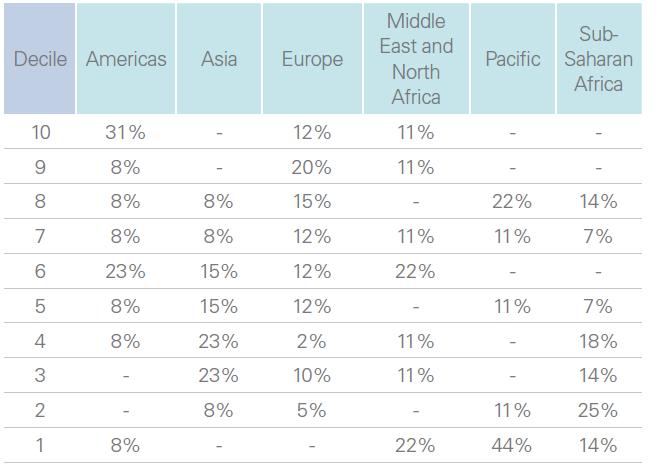
Distribution of parliaments by region for each decile ranking
At the bottom of the index, parliaments in countries like Djibouti, Lesotho, Madagascar, and the Central African Republic scored an average of 1 out of 10, reflecting significant gaps in digital adoption.
To address these gaps, the report recommends that institutions and governments develop clear strategic visions and comprehensive digital strategies; allocate adequate financial, human, and technological resources; establish robust governance frameworks; invest in capacity building; prioritize citizen participation; and strengthen inter-parliamentary collaboration.
Additionally, generative artificial intelligence is highlighted as a strategic lever to accelerate parliamentary digital transformation, offering the potential to deliver valuable insights and enhance the accessibility of parliamentary processes.
Samira Njoya
Lire aussi:
Anambra aims to integrate information and communication technologies across all sectors of the economy. It previously initiated projects to strengthen digital infrastructure, notably through a project to establish an Internet Exchange Point.
Anambra State, Nigeria, plans to develop its own data management platform as part of efforts to fast-track its digital transformation. With an estimated budget of 97.08 million naira (about $57,200), the project received approval last week during a State Executive Council meeting.
“By enabling better data integration across sectors, the platform will ensure that vital information is accessible in real-time for decision-makers, supporting data-driven governance,” said Law Mefor, Anambra’s Commissioner for Information.
The initiative is part of Anambra’s broader ambition to leverage technology to improve governance and drive development. Guided by its strategic vision, "Everything Technology, and Technology Everywhere," the state government aims to establish a digital economy that attracts investors, innovators, and businesses.
To achieve these digital ambitions, Anambra has been implementing various projects to upgrade its digital infrastructure. In August 2023, the state eliminated right-of-way fees to speed up fiber optic deployment. By July 2024, it had launched an extensive project to lay 2,400 kilometers of fiber optic cable, a move that supports its goal of providing free Wi-Fi across the state. Additionally, the government is planning to establish other essential digital infrastructure, including an Internet Exchange Point (IXP).
This data management platform is expected to contribute to Nigeria’s broader digital transformation, as Africa’s digital economy is projected to reach at least $712 billion by 2050—equivalent to 8.5% of the continent's GDP—according to a joint study by the International Finance Corporation (IFC) and Google. However, the timeline for the platform’s development and implementation has not yet been disclosed.
Isaac K. Kassouwi
More...
Satellite technologies are becoming a strategic tool for nations looking to fast-track their digital development. In this context, access to advanced technologies is essential to meet the growing demand for connectivity.
Augustin Kibassa, Congolese Minister of Posts, Telecommunications, and Information and Communication Technologies (PT-NTIC), visited the facilities of satellite manufacturer Thales Alenia Space in France on Thursday. During his visit, Kibassa met with European company executives and toured the entire satellite production process, from design to launch. This visit aligns with the Congolese government's goal of developing satellite capabilities to meet a range of national needs.
Just two days earlier, on November 12, the Democratic Republic of the Congo (DRC) signed a memorandum of understanding with satellite operator Monacosat. This strategic partnership reflects the DRC's ambition to expand its internet capacity through various telecom technologies, aiming to deliver quality telecom services nationwide, including its most remote regions.
While the PT-NTIC ministry has not disclosed specific strategic goals for the Thales Alenia Space visit, the trip suggests potential responses to the DRC's previously expressed concerns about territorial surveillance. In 2022, the Congolese government announced its interest in acquiring a $100 million Earth observation satellite funded domestically. An official tender was issued by the Ministry of Scientific Research and Technological Innovation that November.
Whether for telecommunications or Earth observation, satellites represent high-value technology. For the DRC, which faces significant security and economic challenges, satellites could be instrumental in securing borders and localities against rebel groups, identifying areas affected by natural disasters, combating illegal mining activities, and assessing the condition of the country's critical infrastructure.
Samira Njoya
International money transfers play a key role in the global economy, facilitating financial exchanges worldwide. In Africa, the rise of mobile money has revolutionized these transactions, significantly boosting financial inclusion.
Mobile money transfers between countries were among the fastest-growing services in Africa in 2023. The total amount sent reached nearly $29 billion, a 33% increase from $22 billion in 2022, according to the GSMA.
In The State of the Industry Report on Mobile Money 2024 , published last April, the GSMA explains that this growth was largely driven by the Covid-19 pandemic. During this period, diasporas worldwide widely adopted mobile money transfers to meet the urgent needs of family members in Africa.
This practice, born out of the necessity for quick, secure, and affordable transactions, has endured, especially given the continent’s low banking rate. Mobile money has thus become a critical alternative to traditional banking services. International transfers via mobile money grew from $16 billion in 2021 to reach $29 billion in 2023.
In 2023, international mobile money transfers accounted for 3.18% of the $912 billion transacted through mobile money in sub-Saharan Africa. Although modest, these transfers play a vital role in the sector. Merchant payments, another significant component, reached $74 billion, or roughly 8.11% of the total mobile money transactions, up 14% from 2022. Additionally, transfers between banks and mobile money services (in both directions) rose 15% year-on-year, reaching $210 billion in 2023, according to the GSMA.
Challenges and Recommendations for Further Development
Despite this strong growth, the expansion of international mobile money transfers in sub-Saharan Africa faces structural challenges. One key issue is the relatively low adoption of mobile financial services, even though mobile phone penetration is high. In 2023, the region counted 856 million mobile money subscriptions out of 980 million mobile phone subscriptions.
To accelerate growth in this sector, the GSMA recommends increasing partnerships between telecom operators and banks to enhance interoperability and lower transaction costs. Meanwhile, governments could support these efforts by investing in digital infrastructure in remote areas and adopting favorable regulations. These actions would make mobile money services even more accessible, amplifying their impact on financial inclusion globally.
Samira Njoya
Africa hosts a growing number of startups fueled by increasing digitalization. However, many struggle to scale due to limited resources and mentorship. Targeted programs are essential to enhance their growth and competitiveness locally and globally.
The National Agency for Science and Engineering Infrastructure (NASENI) has partnered with AfriLabs to launch the NASENI Innovation Hub, aimed at empowering Nigerian innovators and startups. The partnership was forged at the 2024 AfriLabs Annual Gathering (AAG) held from November 5 – 8 in Cape Town, South Africa. It aims to bridge the support gap for young creators, providing resources to commercialize groundbreaking technologies and drive sustainable economic growth.
NASENI’s Executive Vice Chairman, Khalil Suleiman Halilu, emphasized the hub’s role in advancing Nigeria’s technological and industrial goals, saying: “At NASENI, we are committed to transforming Nigeria into a global leader in technology and industrialization. The establishment of this innovation hub marks a pivotal step in fostering homegrown solutions, nurturing local talent, and creating a dynamic ecosystem that will drive sustainable development through science and engineering.”
The hub will offer infrastructure, mentorship, and capacity building to nurture ideas, foster industrialization, and position Nigeria competitively in the global tech space. It will run specialized programs, including the NASENI Reverse Japa Programme, which supports Nigerian researchers abroad in commercializing innovations locally, and the DeltHer Expansion Programme, which empowers women in engineering. FutureMakers by NASENI will nurture young innovators through grants and mentorship, while the Placeholder Programme addresses public sector challenges with innovative solutions. NASENI Xceler8 will accelerate startups in science, engineering, and manufacturing.
Nigeria has a vast pool of talented innovators, but a lack of infrastructure, funding, and mentorship often stifles their potential. According to the Global Innovation Index 2024, which captures the innovation ecosystem performance of 133 economies, Nigeria ranked 113th, highlighting the urgent need for focused investment in science, technology, and innovation ecosystems.
This partnership establishes a foundation for a sustainable innovation ecosystem to drive Nigeria’s industrialization and economic transformation. By empowering innovators and fostering collaboration, NASENI and AfriLabs are building a future where Nigerian innovations thrive locally and impact the global stage.
Hikmatu Bilali
Between 2022 and 2024, African countries saw their average scores on the E-Government Development Index rise by 4.8%, from 0.4054 to 0.4247. Djibouti is keeping pace with this trend, ramping up efforts to digitize as many services as possible.
Djibouti announced, on November 14th, the pilot phase of a digital building permit platform. The platform is designed to streamline and speed up the permit process for both individuals and businesses. This move follows the May 2024 announcement at the 8th session of the Council of Ministers, where plans for an e-permit system were first unveiled. The platform is set to integrate into the national online services portal, which already offers a variety of digital public services.
To support this initiative, the Djiboutian government has sought technical and financial partnerships. Earlier this week, they reached out to the European Union as part of the "Global Gateway" investment strategy. The e-permit implementation is part of the broader "Djibouti Digital Foundation" project, which aims to accelerate the country's digital transformation.
A United Nations report released in September categorized Djibouti as a country with a medium E-Government Development Index (EGDI), scoring 0.2911 out of 1. However, Djibouti's Online Services Index, a component of the EGDI, remains low at 0.2092 in 2024.
During the pilot phase, building permits will be issued within seven days, as stated on Djibouti's national online services portal. Applications can be submitted from Saturday to Thursday between 7 AM and 2 PM.
Adoni Conrad Quenum


